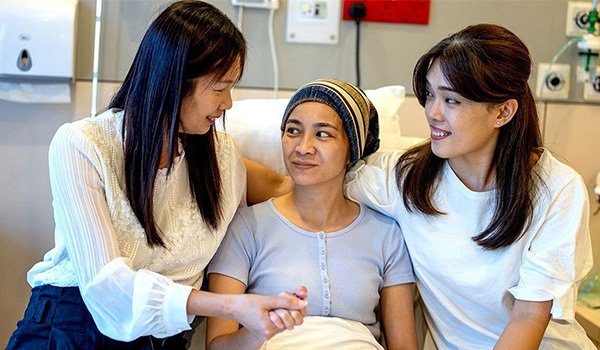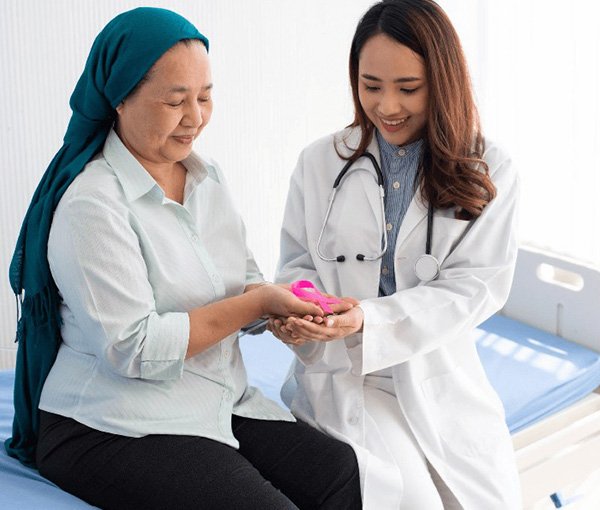Best Targeted Therapy Clinic in Gurgaon
At The Onco Clinic in Gurgaon, we offer targeted therapy and daycare treatments crafted to fight cancer with precision and sensitivity. Guided by seasoned oncologists and supported by empathetic caregivers, our practice combines evidence-based medical proficiency with holistic care so that patients get effective cancer treatment in a safe and comfortable setting.
We incorporate targeted therapy with other supportive cancer treatments to provide not only medical treatment but total physical, nutritional, and emotional care to each patient.
Book an Appointment
What is Targeted Therapy?
Targeted Therapy is a cancer treatment that makes use of medications to target cancer cells with mutations in genes or proteins, usually preserving healthy cells. This form of treatment is also called precision or personalized medicine. Physicians perform tests before starting to identify the specific mistakes within the tumor that the drugs can attack. The targeted therapies, which are tablets or customised antibodies, function by preventing cancer cells from expanding and causing them to die or aiding the immune system in stopping them.

How Does Targeted Therapy Work in Cancer Treatment?
Targeted therapy drugs are designed to:
- Block messages that allow cancer cells to multiply and multiply.
- Genes, target proteins and the blood supply to the tumor are vital for the cancer to live.
- Stop cancer from spreading by stopping its growth processes.
- Collaboration with chemotherapy, immunotherapy or radiation therapy to improve outcomes.
This is the reason targeted therapy is an excellent treatment option for many blood cancers and solid tumors.

Cost of Targeted Therapy in Gurgaon
The price varies based on cancer type, the particular targeted medicine prescribed, and the number of sessions needed.
- Single session: ₹2 lakh to over ₹4 lakh
- Full course: ₹ 6.85 lakh (variable based on treatment period and medication combination)
- Infusion Services (each cycle): 10000 onwards (including consumables, Day care charges, Nursing Charges and Consumables)
- Targeted Therapy medicines (Max Discount upto 60% on MRP Or/with PAP - Patient assistance program by pharma company if any)
- Full course (Depends on number of Targeted Therapy sessions/Cycles)
At The Onco Clinic, Gurgaon, we offer absolute cost transparency in terms of session-wise detailed fees and customized treatment planning.
Who Needs Targeted Therapy?
Targeted therapy may be recommended for:
- Patients suffering from cancer who show positive tests for specific biomarkers or genetic mutations.
- Patients with lung, breast, colorectal, renal, or liver disease or blood cancers.
- Patients who are not tolerant or don't respond effectively to chemotherapy.
- Patients who require specific and individualized treatment for cancer.
Types of Targeted Therapy Offered
We offer advanced targeted treatments that include:
- Monoclonal Antibodies – They are lab-created proteins that target specific molecules known as antigens that are present in the body. They work as personalized medicines that aid the immune system to fight cancerous cells or block harmful signals or directly deliver treatment to cells that are affected. MAbs can be used to treat cancer and autoimmune diseases as well as certain infections, safely and effectively.
- Small-Molecule Inhibitors –These are lightweight substances that block certain proteins that are found in cancer cells. They stop the key signals that allow tumors to expand, which may slow the growth of cancer and kill cancerous cells. SMIs are typically prescribed as pills and may include sunitinib as a drug but new ones are being created for more effective treatment.
How Is Targeted Therapy Given?
At our daycare center in Gurgaon, specific therapy is given in a patient-centered arrangement:
- Oral treatment – Certain targeted therapies come in pill or capsule form.
- IV infusions –The majority of treatments are given in outpatient infusions.
- Monitoring and supportive care – Regular checkups, imaging and labs that help keep the environment safe and productive.
Benefits of Targeted Therapy
- Only targets cancer cells with little damage to healthy cells.
- It may work better for cancers with certain genetic mutations.
- It may have fewer side effects than chemotherapy.
- It may be used in conjunction with other therapies for better results.
- Improves quality of life by providing a more individualized treatment method.

Side Effects of Targeted Therapy
While generally better tolerated than chemotherapy, targeted therapy may cause side effects such as:
- Skin rash or dryness
- Diarrhea or nausea
- Fatigue
- High blood pressure
- Changes in liver function
Our oncologists monitor closely and manage side effects promptly to ensure safety.
How to Prepare for Targeted Therapy?
- Tests for biomarkers or genetics to verify the eligibility.
- Tests for blood count: baseline tests and organ function tests. ECG when needed.
- Be sure to share your medical background with your doctor.
- Be aware of what the plan of treatment is, the number of cycles and potential adverse effects.
- Plan for regular monitoring and follow-ups.
What to Expect During and After Treatment?
During treatment: The treatment is administered as a drip in the clinic or in tablets at home. The patient is monitored for some period of time following the treatment to ensure that it's safe.
After treatment: Performing regular tests for blood as well as doctor's appointments to assess how the treatment is working, and also to manage any adverse consequences.
Why Choose The Onco Clinic for Targeted Therapy in Gurgaon?
- Experienced oncologists specializing in targeted treatments.
- Modern daycare setup with advanced monitoring and comfort.
- Strict adherence to evidence-based and personalized cancer care.
- Transparent costs and ethical practices.
- Holistic support covering medical, nutritional, and emotional needs.
